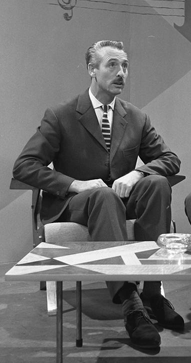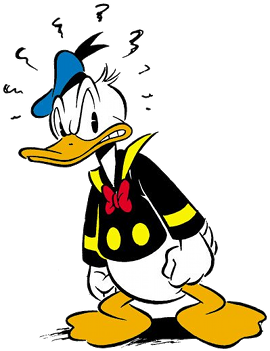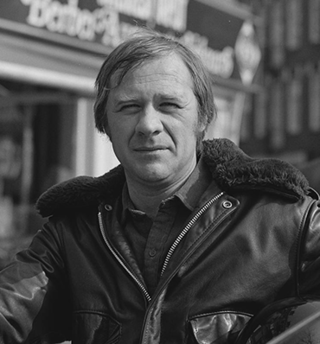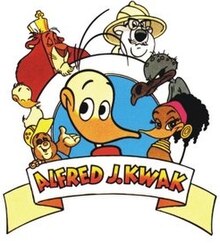
Professor Ludwig Von Drake is a cartoon character created in 1961 by The Walt Disney Company. He is the paternal uncle of Donald Duck. He was first introduced as the presenter in the cartoon An Adventure in Color, part of the first episode of Walt Disney's Wonderful World of Color on NBC. According to the episode The Hunting Instinct of that series he and Donald Duck's father are brothers. He is described as a scientist, lecturer, psychologist, and world traveler. The character displayed his "expert" knowledge on a variety of subjects in eighteen episodes of the classic anthology series, as well as on a number of Disneyland Records.

Goofy is an American cartoon character created by the Walt Disney Company. He is a tall, anthropomorphic dog who typically wears a turtle neck and vest, with pants, shoes, white gloves, and a tall hat originally designed as a rumpled fedora. Goofy is a close friend of Mickey Mouse and Donald Duck, and is Max Goof's father. He is normally characterized as hopelessly clumsy and dim-witted, yet this interpretation is not always definitive; occasionally, Goofy is shown as intuitive and clever, albeit in his own unique, eccentric way.

DuckTales is an American animated television series produced by Walt Disney Television Animation. It originally premiered on syndication on September 18, 1987, and ran for a total of 100 episodes over four seasons, with its final episode airing on November 28, 1990. Based upon Uncle Scrooge and other Duck universe comic books created by Carl Barks, the show follows Scrooge McDuck, his three grandnephews Huey, Dewey, and Louie, and close friends of the group, on various adventures, most of which either involve seeking out treasure or thwarting the efforts of villains seeking to steal Scrooge's fortune or his Number One Dime.

Hermannus Jantinus van Veen is a Dutch stage performer, actor, author, singer-songwriter and musician. He worked with accompanists Laurens van Rooyen and Erik van der Wurff, both of whom were pianists and composers.

The Twisted Tales of Felix the Cat is an American animated television series produced by Film Roman. The series first aired on September 16, 1995 on CBS Saturday mornings lasting for two seasons with the final episode airing on April 12, 1997. The first season consists of 13 episodes and the second and final season consists of 8 episodes.
Melvyn Hayes is an English actor and voice-over performer. He is best known for playing the effeminate Gunner "Gloria" Beaumont in the 1970s BBC sitcom It Ain't Half Hot Mum, for appearing in the Cliff Richard musical films The Young Ones, Summer Holiday and Wonderful Life as well as Here Come the Double Deckers (1970–1971).

The Netherlands men's national basketball team represents the Netherlands in international basketball matches. The national team is governed by Basketball Nederland.

Captain Zeppos was a Belgian children's television series, which aired in 1964 and 1968. It was based on a script by Lode De Groof. In all, the BRT made three series with a Flemish actor, Senne Rouffaer, in the title role. All episodes, except episode 16 which is a recap, have been released on DVD with Dutch subtitles and extras.
Frizzle Sizzle were a Dutch teenage girl group of the 1980s. Their biggest hit was "Alles Heeft Een Ritme", which they performed at Eurovision in Norway in 1986.
de Buddy's was a boys' show choir based in Delft, Netherlands that existed under this name from 1976 - 2005. The choir was founded as a traditional church choir in 1966 as De Nicolaessanghers with 30 voices from 9–16 years. Inspired from the French choir Les Poppys and their hit "Non, non, rien n'a changé" the choir was renamed and changed to the pop genre. In 2005 de Buddy's was succeeded by re-speKt.

David Gijsbert van der Linden, known as Dolf van der Linden, was a Dutch conductor of popular music with a reputation which extended beyond the borders of the Netherlands.

Donald Duck is a cartoon character created by The Walt Disney Company. Donald is an anthropomorphic white duck with a yellow-orange bill, legs, and feet. He typically wears a sailor shirt and cap with a bow tie. Donald is known for his semi-intelligible speech and his mischievous, temperamental, and pompous personality. Along with his friend Mickey Mouse, Donald was included in TV Guide's list of the 50 greatest cartoon characters of all time in 2002, and has earned a star on the Hollywood Walk of Fame. He has appeared in more films than any other Disney character.
Harald Siepermann was a German animator and character designer. His feature film credits included Who Framed Roger Rabbit, Tarzan, and Enchanted. He lectured extensively on character design and animation.

Sjef van Oekel was a TV comedy character created by Dutch artist Wim T. Schippers and played by Dutch comedian, singer and actor Dolf Brouwers (1912–1997). Van Oekel started as a side character in De Fred Hachéshow in 1972 but became such a cult figure that he gained his own television show, Van Oekel's Discohoek, songs and even a comic strip, all written by Schippers.

Erik van der Wurff was a Dutch pianist, composer, arranger, record producer and conductor. He worked mainly on soundtracks and as a composer for many film and television shows. He also made acting appearances in two Dutch-German television shows in 1977 and 1980. He was the regular pianist and composer on the Herman van Veen shows. He composed music for many theater productions, musicals, movies and for the comic series Alfred Jodokus Kwak which was aired in various countries.
Laurens van Rooyen was a Dutch pianist and composer. He was known for his cooperation in the theater with Herman van Veen. He composed many pieces for the piano and wrote the score for several Dutch films. He wrote two books on his experiences as a musician.

Fredericus Amos (Frits) Lambrechts is a Dutch actor, musician and cabaret artist.

Paul van Vliet was a Dutch comedian, singer and goodwill ambassador of UNICEF. In 1957, he started his career as a comedian within the student cabaret of Leiden, whereupon he performed with Cabaret PePijn from 1964 until 1969. Since 1970, he had a successful solo career as a cabaret artist. As a musician, Van Vliet was best known for his songs Veilig Achterop and Pappa Is Blijven Hangen Aan De Sixties. In the animated TV series Alfred Jodocus Kwak, he voiced King Radboud.












